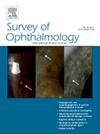Effectiveness and safety of anti-vascular endothelial growth factor therapies for macular edema in retinal vein occlusion: A systematic review and network meta-analysis of randomized controlled trials
IF 5.9
2区 医学
Q1 OPHTHALMOLOGY
引用次数: 0
Abstract
We evaluated the efficacy and safety of anti-vascular endothelial growth factor (anti-VEGF) therapies for macular edema (ME) secondary to retinal vein occlusion (RVO), a leading cause of vision loss. A comprehensive search of 6 databases identified 17 RCTs involving 4272 eyes. Eligible studies reported outcomes such as visual acuity, ETDRS letter scores, central retinal thickness (CRT), and adverse events, with follow-up of at least 6 months. Anti-VEGF therapy showed significant efficacy, with a pooled mean difference (MD) of 15.14 ETDRS letters (95 % CI: 14.24–16.03, p < 0.001). Over 12 months, patients were 2.87 times more likely to achieve gains of > 15 ETDRS letters (OR 2.87, 95 % CI: 2.21–3.72). CRT decreased by MD of −350 µm (95 % CI: −0.363 to −0.338, p < 0.001). Safety analysis revealed reduced treatment-related adverse events (TRAEs) (OR 0.88, p = 0.035) with no significant systemic risks. Intraocular pressure elevation (OR 1.924, p < 0.001) warrants monitoring. Subgroup analysis highlighted faricimab as most effective, with aflibercept, ranibizumab, and bevacizumab providing substantial benefits. Anti-VEGF therapy is an effective, safe cornerstone for managing ME in RVO. Further research should explore biomarkers and combination treatments to refine therapeutic approaches.
抗vegf治疗视网膜静脉闭塞黄斑水肿的有效性和安全性:随机对照试验的系统回顾和荟萃分析。
我们评估了抗血管内皮生长因子(VEGF)治疗继发于视网膜静脉阻塞(RVO)的黄斑水肿(ME)的疗效和安全性,RVO是视力丧失的主要原因。对6个数据库进行全面检索,确定了17项随机对照试验,涉及4272只眼睛。符合条件的研究报告了视力、ETDRS字母评分、视网膜中央厚度(CRT)和不良事件等结果,随访至少6个月。抗vegf治疗显示出显著的疗效,合并平均差异(MD)为15.14 ETDRS字母(95% CI: 14.24-16.03, p < 0.001)。在12个月的时间里,患者获得bbb15 ETDRS评分的可能性是2.87倍(OR 2.87, 95% CI: 2.21-3.72)。CRT降低MD -350µm (95% CI: -0.363 ~ -0.338, p < 0.001)。安全性分析显示治疗相关不良事件(TRAEs)减少(OR 0.88, p = 0.035),无显著系统性风险。眼压升高(OR 1.924, p < 0.001)值得监测。亚组分析强调法利西单抗是最有效的,阿非利西普、雷尼单抗和贝伐单抗提供了实质性的益处。抗vegf治疗是治疗RVO患者ME的有效、安全的基石。进一步的研究应该探索生物标志物和联合治疗来完善治疗方法。
本文章由计算机程序翻译,如有差异,请以英文原文为准。
求助全文
约1分钟内获得全文
求助全文
来源期刊

Survey of ophthalmology
医学-眼科学
CiteScore
10.30
自引率
2.00%
发文量
138
审稿时长
14.8 weeks
期刊介绍:
Survey of Ophthalmology is a clinically oriented review journal designed to keep ophthalmologists up to date. Comprehensive major review articles, written by experts and stringently refereed, integrate the literature on subjects selected for their clinical importance. Survey also includes feature articles, section reviews, book reviews, and abstracts.
 求助内容:
求助内容: 应助结果提醒方式:
应助结果提醒方式:


